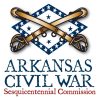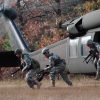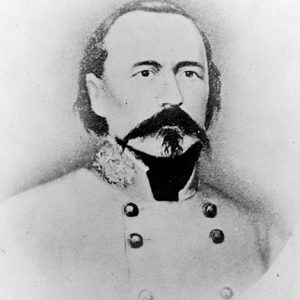calsfoundation@cals.org
John Porter McCown (1815–1879)
Tennessee native John Porter McCown pursued a long military career concluding with service as a major general in the Confederate army in the Civil War. After the war, he moved to Magnolia (Columbia County), where he became a respected citizen and farmer.
John P. McCown was born in Sevierville, Tennessee, on August 19, 1815, one of seven children of George Wesley McCown and Mary Caroline Porter McCown. After receiving a basic education in his home state, he accepted an appointment to the military academy at West Point, where he graduated tenth in his class in 1840.
After graduation, he embarked upon a long military career, initially as an officer in the artillery, participating in campaigns against western Indian tribes and also serving along the Canadian border in 1840–41. He served in Texas in the 1840s and in the war with Mexico, receiving a brevet captain’s commission for his actions in the 1847 Battle of Cerro Gordo. After the war, he returned to duty along the Rio Grande River in Texas. In 1851, he was promoted to captain in the Fourth U.S. Artillery. He served against the Seminoles in Florida in 1856–57 and in the 1858 Utah Expedition against the Mormons. He performed garrison duty in Nebraska and the Dakotas from 1858 to 1861.
At the outbreak of the Civil War, McCown resigned his United States commission on May 17, 1861, entering Confederate service in the western theater. He was made captain, then lieutenant colonel and colonel of artillery. He quickly rose through the ranks and was appointed a brigadier general on October 12, 1861. He saw his first action at Columbus, Kentucky, in November. From April to June 1862, he was involved in activities at Fort Pillow, Tennessee, and led a division during the Corinth, Mississippi, siege in late 1862. He commanded a division in the unsuccessful 1862 Confederate invasion of Kentucky, participating in the Battle of Richmond. By early March 1862, he had been transferred to Missouri, where he oversaw the defense of New Madrid and Island No. 10. He was forced to evacuate his defensive positions after about two months. He received much criticism (mostly from General Braxton Bragg), and despite having been promoted to major general on March 10, he was relieved of his New Madrid command; he was later cleared of any malfeasance.
A short time after his removal, he was placed in command of the Second Division of the Army of the West, and by June he was promoted to temporary command of the army. By late June, his command was combined with the Army of Mississippi and, with further consolidation, became part of the newly formed Army of Tennessee. His division was assigned as a part of General William J. Hardee’s Corps. In that capacity, he participated in the December 1862 Battle of Stones River in Tennessee.
After the battle, McCown and a group of Confederate generals became embroiled in a dispute with their commanding general, Braxton Bragg. As a result, McCown was court-martialed for failure to fully follow orders. In March 1863, after being found guilty of disobedience of orders during the battle, he was suspended from active duty without pay for six months.
During the last two years of the war, a bitter McCown held only minor command positions and, by 1865, was serving in North Carolina, where in April he successfully led Confederate home guard forces against Union cavalry near Morganton. The war ended shortly after this engagement, with McCown being paroled at Salisbury the next month.
Shortly after the end of the war, he moved to Knoxville, Tennessee, where he obtained work as a school teacher. After traveling to Arkansas to visit with his brother George in 1868 at his home in Magnolia, McCown purchased a house in the southeastern section of the town, moving there soon afterward. He quickly became a respected citizen known for his farming and generosity. The former general was known for displaying a number of historic war relics in his home. Over time, he gave away many of these items, including his personal flag carried during the war.
McCown died in Little Rock (Pulaski County) on January 22, 1879, of pneumonia. He had been visiting the capital city attending Masonic and Odd Fellows meetings. His body was returned to his adopted Magnolia and interred in the Magnolia City Cemetery.
For additional information:
“The Late Gen. McCown.” Arkansas Democrat, February 11, 1879, p. 2.
“Magnolia Pays Tribute to Noted Confederate Leader.” Part II. Arkansas Gazette, May 22, 1927, p. 8.
Wakelyn, Jon L. Biographical Dictionary of the Confederacy. Westport, CT: Greenwood Press, 1977.
Warner, Ezra J. Generals in Gray: Lives of the Confederate Commanders. Baton Rouge: Louisiana State University Press, 1987.
Mike Polston
CALS Encyclopedia of Arkansas








General John Porter McCown, a Confederate major general during the American Civil War, notably spent time in Starkville, Mississippi, in 1863. Following a court-martial that led to a six-month suspension from duty, McCown was assigned to oversee Confederate forces in the area. Despite the controversy surrounding his earlier command at Island No. 10, where he faced criticism for abandoning positions during a siege, McCown’s leadership in Starkville was part of his continued service in the Western Theater of the war. His presence in Starkville is a testament to the complex and often contentious nature of Civil War military leadership.